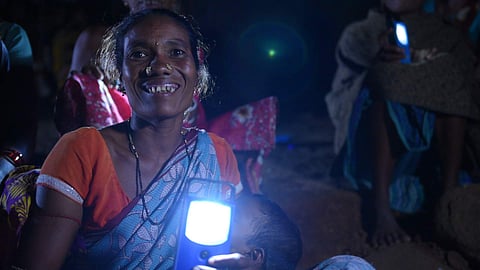

It's been 12 years since Think Peace started its work in 230 hamlets in what is now Andhra Pradesh and they still strive to do their best. What started with the founder, Kiran Chukkapalli distributing solar lights and teaching the tribal folk how to repair and maintain them, has now evolved into an NGO that has taken on its most "ambitious programme yet,” says Chukkapalli.
Access to healthcare in villages is scarce and getting to a doctor is a task in itself. To set this right, Think Peace has decided to launch (tentatively on March 23) Arogyam, a healthcare programme that combines local sources and technology. A few locals are trained in the basics of diagnosis and treatment with the use of devices that are simple and easy to use. They can even get in touch with a doctor in case they have any issues. "Not only this, the doctors will have access to the medical reports as all the records will be documented online," says Chukkapalli, adding that they hope to pilot this in villages like Sai Nagar, Kothavalasa and more.
And that's not all. The women of these hamlets are already skilled at making Vistaraku, a disposable plate made of broad leaves. Think Peace is exploring new markets for these plates and are currently engaged in procuring sewing machines at a subsidised rate. They also wish to improve the literacy levels of the middle-aged villagers by setting up a school for adults and are looking for a market space for local produce like turmeric, pepper, raagi and more. "All of this is still in the planning stage though," clarifies Chukkapalli. What is common among most of their initiatives is that they train local hands for projects. "Sustainability and scalability, that's our aim,” he says, adding, "We believe it is our responsibility to make sure that every programme we initiate in the valley is self-sustainable and not dependent on the organisation's presence. We will always be there in the valley and for our tribes, but the idea is to liberate them and not make them dependent on us."
Speaking more about the villages and the people she has worked with for the past six years, Vandana Mamidanna, Director – Operations, calls everyone of them an absolute gem. "Not once in my six years of service have I felt threatened as a girl. We have worked into the wee hours of the night and yet, I have never felt unsafe," she says, adding that though alcoholism is a problem with the older generation, the younger generation avoids it as they have seen, first-hand, the damage it can cause. These villages, nestled among hills and mountains, are picturesque and the people, whose main occupation is farming, eat what they grow. And Think Peace intends to preserve the pristine environment by doing more for it.
